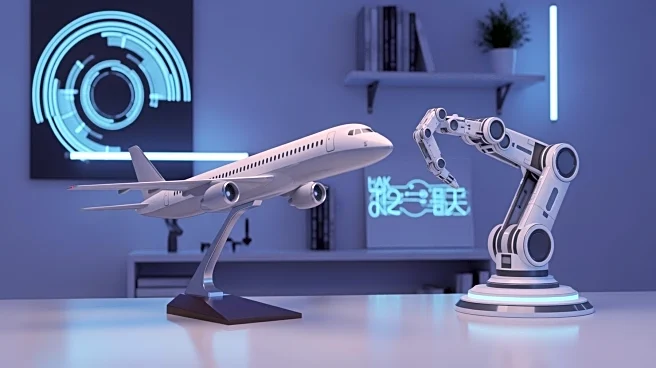What's Happening?
United Airlines has announced plans to further reduce its corporate workforce by 4% in 2026, following a similar reduction this year. The decision is part of a broader strategy to enhance operational efficiency
through the use of artificial intelligence (AI). During a third-quarter earnings call, United CFO Mike Leskinen emphasized the role of AI in streamlining processes and improving the efficiency of the headquarters management team. The airline is implementing various technological upgrades, including those related to operations and maintenance, to support this initiative. This move aligns with industry trends, as other airlines like Lufthansa have also announced workforce reductions to boost efficiency by leveraging AI.
Why It's Important?
The reduction in United Airlines' corporate workforce highlights the growing influence of AI in the aviation industry. By optimizing processes and reducing human resource needs, airlines can potentially lower operational costs and improve service delivery. This shift may lead to significant changes in employment patterns within the industry, affecting thousands of jobs. As airlines increasingly adopt AI technologies, they may gain competitive advantages through enhanced efficiency and cost savings. However, this trend also raises concerns about job security and the need for workforce retraining to adapt to new technological demands.
What's Next?
United Airlines is expected to continue its focus on AI-driven efficiency improvements, which may lead to further workforce adjustments in the coming years. The airline industry as a whole may see increased adoption of AI technologies, prompting other carriers to follow suit in reducing workforce sizes. Stakeholders, including employees and unions, may seek to negotiate terms that address job security and retraining opportunities. Additionally, regulatory bodies might evaluate the implications of AI on employment and industry standards, potentially influencing future policy decisions.
Beyond the Headlines
The integration of AI in the aviation sector could lead to broader ethical and cultural shifts, as companies balance technological advancements with human workforce considerations. The potential for AI to reshape job roles and responsibilities may necessitate new educational and training programs to equip employees with relevant skills. Furthermore, the reliance on AI raises questions about data privacy, security, and the ethical use of technology in decision-making processes.









